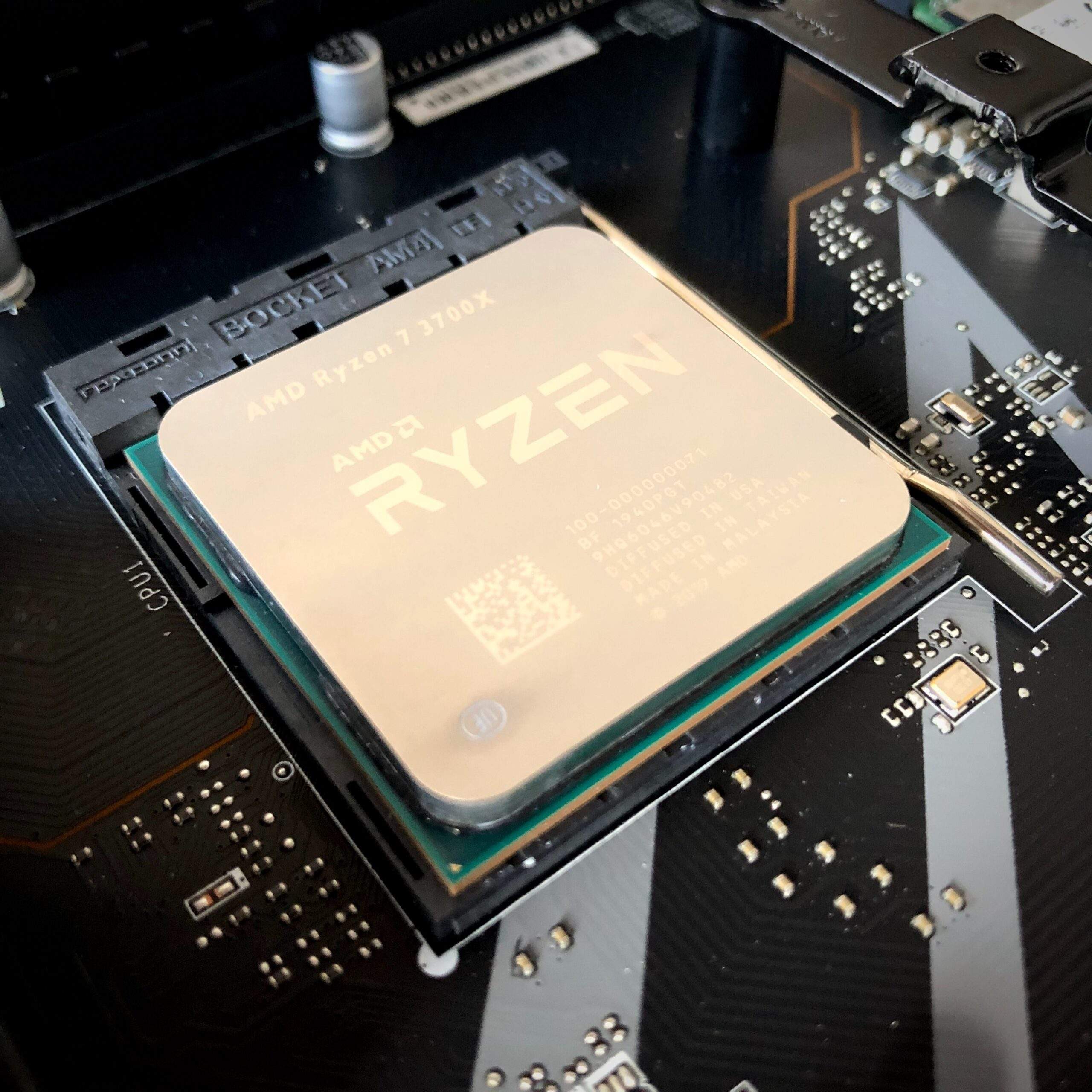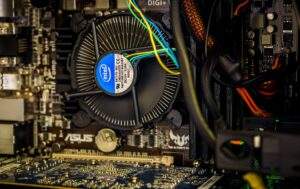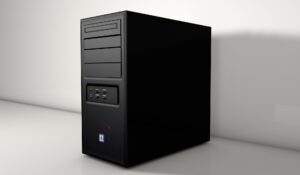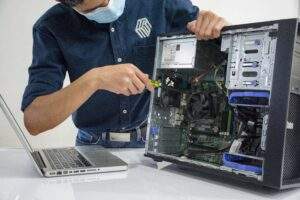
Your Gaming PC Is BOTTLENECKED! – Here’s How To Fix It!
What Are CPU Bottleneck and GPU Bottleneck? As a gamer, you may have come across the terms “CPU bottleneck” and “GPU bottleneck” while troubleshooting performance
In today’s world, computers have become an essential part of our daily lives. We use them for various purposes, including work, entertainment, and communication.
However, with the advancement of technology, the performance of computers has become a critical factor in determining the user experience. One of the essential tools for optimizing system performance is a bottleneck calculator. Furthermore, in this article, we will discuss the bottleneck calculator in detail, its importance in system optimization, how it works, and tips for optimizing system performance.
A bottleneck calculator is a tool that helps in determining the weak link in a computer system. It provides an analysis of the system’s performance and helps users identify areas where there is a potential for slowing down the system.
Moreover, In simpler terms, think of a bottleneck calculator as a tool that helps identify the slowest part of a computer system. This could be the processor, the memory, or even the storage drives. Once identified, users can take steps to upgrade or optimize these components to improve overall system performance.
However, A bottleneck calculator can come in handy when you are experiencing lags while using your computer, especially while running resource-intensive applications or software. By identifying the source of the problem, you can make an informed decision on how to improve your computer’s performance.
Additionally, Using a bottleneck calculator is simple. You just need to input the specifications of your computer system, including the processor type, the amount of memory, and the type of storage device(s) you are using. The calculator then uses this data to determine which component is slowing down your system.
There are multiple types of bottleneck calculators available including online and offline calculators.
Online calculators are available through websites, whereas offline calculators are standalone software installed on your computer. Online calculators offer convenience and do not require additional software to be downloaded, whereas offline calculators may provide more advanced features and can be quicker to use.
A CPU bottleneck occurs when the Central Processing Unit is overworked and is unable to keep up with the demands of the system, while a GPU bottleneck occurs when the Graphics Processing Unit is overworked and is unable to keep up with the demands of the system.
Bottlenecks affect system performance by limiting the speed at which the computer can process data. If the CPU or GPU is underpowered, it can cause applications and games to run slower than expected. The CPU GPU bottleneck calculator is important because it identifies the slowest component in the computer system.
This allows users to optimize and upgrade the slow component, thus improving overall system performance. The CPU GPU bottleneck calculator works by analyzing the specs of the system including the CPU, GPU, and RAM, and determines which component is underperforming.
A bottleneck calculator is important in system optimization because it helps users determine which component is slowing down the overall system performance. Once the bottleneck is identified, the user can take steps to upgrade or optimize these components to improve the overall system performance.
Bottlenecks can have a significant impact on gaming performance by reducing the speed at which the game can process data. This can cause games to run slower and with lower-quality settings.
Bottlenecks can affect the system’s performance by limiting the overall speed at which the system can process data. This can reduce the system’s lifespan because it can cause the system to work harder, which can lead to faster hardware degradation.
The acceptable bottleneck range for a computer system is dependent on the system’s components and the workload being performed. It is important to keep bottlenecks to a minimum. Otherwise, they can cause slower application and game performance, increased system heat, and the risk of hardware failure.
The acceptable bottleneck range is determined by CPU and GPU performance, and the type and speed of memory being used. System components that can impact the acceptable bottleneck range include the processor, graphics card, and memory. It is important to note that some bottlenecks cannot be avoided. For example, it is common for the graphics card to be the bottleneck in a computer gaming system.
In general, as long as the bottleneck is not causing significant performance degradation, it is considered acceptable. However, if you are encountering significant slowdowns or other issues, it may be time to consider upgrading or optimizing the underperforming component.
Using a bottleneck calculator is a simple process. Here is a step-by-step guide on how to use a bottleneck calculator:
It is recommended to use multiple bottleneck calculators to get a better understanding of your system’s performance, as some calculators may produce slightly different results. When using a bottleneck calculator, it is important to use accurate and up-to-date system specifications to obtain an accurate rating.
When using a bottleneck calculator, there are common mistakes that you should avoid to ensure accurate results. Here are some common mistakes to avoid when using a bottleneck calculator:
It is important to input accurate and up-to-date specifications of your computer system to obtain accurate results.
If you have overclocked your CPU or GPU, you must take this into consideration when using a bottleneck calculator.
A bottleneck calculator analyzes the system as a whole rather than focusing on a single component. It is important to consider all components to obtain accurate results.
Different components are suitable for different purposes. When using a bottleneck calculator, you must consider the intended use of your computer system.
A bottleneck calculator should only be one of many tools used to optimize your system’s performance. It is important to conduct additional research and consult with professionals to obtain the best results.
By avoiding these common mistakes, you can ensure accurate results and make informed decisions to optimize or upgrade your system’s components for better performance.
Optimizing system performance can be crucial for people who work with demanding software or use their computers for gaming. Here are some tips for optimizing system performance:
Identify and reduce bottlenecks in the system by upgrading or optimizing underperforming components such as the CPU, memory, and storage.
Overclocking CPU and GPU, installing the latest drivers, and minimizing the number of open applications can improve system performance.
Overheating can slow down the system’s performance. Use effective cooling strategies such as installing additional fans, using a cooling pad, or liquid cooling.
Upgrading system components such as the RAM, storage device, or graphics card can lead to improved system performance.
Remove programs and files that are no longer needed or use a large number of system resources.
Regular maintenance such as disk cleanup, defragmentation, and antivirus scans can help optimize the system’s performance.
By following these tips, you can significantly reduce system bottlenecks, optimize components, and improve overall system performance.
To avoid bottleneck problems in computer systems, certain specifications and combinations of components are recommended. Here are some system recommendations for optimal performance without bottleneck problems:
Choosing a compatible combination of CPU and GPU is important to ensure system stability and optimal performance. Check the specifications of your CPU and GPU to ensure compatibility.
A graphics card with higher memory bandwidth can improve system performance in graphics-intensive tasks such as gaming or video rendering.
Using high-speed memory such as DDR4 can help improve system performance significantly.
Solid State Drives can offer faster data transfer speeds as compared to conventional hard drives, leading to improved system performance.
An efficient cooling system ensures that the system remains stable and performs optimally by regulating the temperature of the CPU and GPU. By considering these recommendations, users can build a computer system that avoids bottleneck problems and offers optimal performance.
here are 5 systems with their specifications and details that are optimized for performance without bottleneck problems:
AMD Ryzen 9 5900X
CPU: AMD Ryzen 9 5900X
GPU: NVIDIA GeForce RTX 3080
RAM: 32GB DDR4
Storage: 1TB NVMe SSD
Cooling: Liquid Cooling
The system has a strong CPU and GPU combination that can easily handle resource-intensive applications and games, without facing any bottleneck problems. It also has a liquid cooling system that ensures efficient heat management, supporting high performance for longer durations.
Intel Core i9-11900K
CPU: Intel Core i9-11900K
GPU: AMD Radeon RX 6900 XT
RAM: 64GB DDR4
Storage: 2TB NVMe SSD
Cooling: Air Cooling
The system is designed for top-notch gaming and work performance, boasting a dominant Intel Core i9 processor and an AMD Radeon graphics card. Its storage capacity and memory are also great with 2TB NVMe SSD and 64GB of RAM, which allow for seamless multitasking without slowdowns.
AMD Ryzen 7 5800X
CPU: AMD Ryzen 7 5800X
GPU: NVIDIA GeForce RTX 3070
RAM: 16GB DDR4
Storage: 1TB NVMe SSD
Cooling: Air Cooling
If you’re a gamer or content creator looking for a high-performance system that’s affordable, this system is ideal for you. It has a Ryzen 7 CPU and RTX 3070 GPU that ensures smooth gameplay and excellent video rendering performance.
Intel Core i7-11700K
CPU: Intel Core i7-11700K
GPU: NVIDIA GeForce RTX 3060 Ti
RAM: 32GB DDR4
Storage: 1TB NVMe SSD
Cooling: Liquid Cooling
The system includes an Intel Core i7 CPU and NVIDIA GeForce RTX 3060 Ti GPU that work efficiently together without any bottleneck issues. Additionally, the liquid cooling system keeps the system cool even during prolonged gaming sessions or heavy workloads.
AMD Ryzen 5 5600X
CPU: AMD Ryzen 5 5600X
GPU: NVIDIA GeForce GTX 1660 Super
RAM: 16GB DDR4
Storage: 512GB NVMe SSD
Cooling: Air Cooling
This system is optimized for budget-conscious users looking for a reliable and efficient system. The Ryzen 5 CPU and GTX 1660 Super GPU provide solid performance for everyday use and light gaming without any bottleneck issues. The air cooling system ensures efficient cooling without additional expenses for liquid cooling.
Note: The exact specifications and components of the systems may vary depending on the manufacturer and availability of parts at the time of purchase.
These processors offer high processing capabilities and are often used in high-performance computers.
Looking for reviews of Intel Core i7 or AMD Ryzen 7 processors? Here are some resources to check:
These resources can help users get an idea about the performance of Intel Core i7 or AMD Ryzen 7 processors through comprehensive benchmark tests and user reviews before they make a purchase decision
A bottleneck calculator is an essential tool for users who want to build a computer system that offers optimal performance without facing any issues. Through careful consideration of the CPU and GPU models, as well as other components such as RAM and storage, one can build a powerful system that can handle any task without experiencing bottlenecks.
The above-mentioned systems have the perfect combination of components that can provide an amazing performance experience for gaming and work applications. For anyone who is looking to build a PC, these systems are an excellent option as they are designed to offer optimal performance without any bottleneck issues.
With the help of a CPU GPU bottleneck calculator and other resources such as user reviews and benchmark tests, users can make an informed purchase decision about the best system for their needs.
A computer bottleneck occurs when one component of the system slows down the performance of the entire system. This is often caused by a component that is not powerful enough to keep up with the demands of other components..
Yes, the graphics card can be bottlenecked if the CPU or other components are not powerful enough to handle the demands of the graphics card.
When there is a CPU bottleneck, the performance of the entire system will be affected. Programs and games may run slower or even crash. The system may also become unstable.
Bottleneck calculators are not always completely accurate. They are based on estimates and assumptions about the performance of different components. However, they can be a useful tool for identifying potential bottlenecks in a system.
Bottleneck calculators work by estimating the performance of different components in a
system and comparing them to identify potential bottlenecks. They may use
benchmarks or other performance metrics to make these estimates.
Bottleneck calculators can be used for overclocking to identify which component may be limiting the performance of the system. However, it’s important to note that overclocking can be risky and may void warranties.
Bottleneck calculators can be used for servers to identify potential bottlenecks and optimize system performance. However, server systems often have unique requirements that may not be addressed by bottleneck calculators designed for consumer systems.
An in-game bottleneck calculator works by analyzing the performance of a game while it’s running and identifying which component may be limiting performance. This can be a useful tool for optimizing system performance for specific games.
The results of bottleneck calculations may not be the same if the system components or software have changed since the last calculation was made. Additionally, the assumptions and estimates used by the bottleneck calculator may be updated over time, leading to different results.

What Are CPU Bottleneck and GPU Bottleneck? As a gamer, you may have come across the terms “CPU bottleneck” and “GPU bottleneck” while troubleshooting performance

The RTX 3060 Ti is a powerful graphics card that can deliver high-end gaming performance. However, it also requires a lot of power. So, is

In this technological era computer, performance is a very important part to determine the overall user experience. No matter if you are a gamer, graphic

Do you want to sell or upgrade your PC and you are trying to calculate your PC’s worth, How Much is My PC Worth? So, You

Are you one of those people who get worried when their computer’s CPU usage goes up to 100%? You’re not alone! High CPU usage can

Are you tired of experiencing slow and choppy gameplay on your PC? Do you want to optimize your gaming experience, but have no idea where